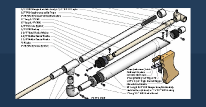
#1

Posted 18 March 2013 - 11:04 PM
Did anyone qualify for/take the AIME this past Thursday? (American Invitational Mathematics Exam). I qualified for it after taking the AMC 12b two weeks before, got a 120. Any one here take either of those tests? I think we need a combined score of 217 to move on to the USAMO. You multiply your raw score on the AIME by ten and add it to your raw score on AMC. That means I had to get 9.7, but no partial credit. 10. We'll see.
If so, let me know. It would be cool to talk through answers and approaches to some of the more difficult problems on the AIME. I thought it was okay.
I know some solutions are posted on the Art of Problem Solving website, but not everything is there. I am specifically thinking about #14, with the trig Taylor Series. Comment down or PM me.
Solved the Rubik's Cube in 46 seconds
"Nobody understands quantum mechanics" - Richard Feynman
#2

Posted 19 March 2013 - 12:11 AM
I'll ask him the next time since he far surpasses me at finding elegant solutions and shortcuts.
Kruger and Dunning (1999)
#3

Posted 19 March 2013 - 02:26 AM
#14 doesn't look too bad but given the time constraints there's probably a brilliant solution I can't think of right now.
Yea, I definitely spent the most time on that but then realized that it probably was not the type of problem that required arduous testing and maneuvering. I figured it required something more elegant. Something much simpler than what I was attempting. I tried a few things along those lines, and we'll see what happens.
Thanks, I'd love to be updated if he fills you in.
Solved the Rubik's Cube in 46 seconds
"Nobody understands quantum mechanics" - Richard Feynman
#4

Posted 19 March 2013 - 01:02 PM
Yea, I definitely spent the most time on that but then realized that it probably was not the type of problem that required arduous testing and maneuvering. I figured it required something more elegant. Something much simpler than what I was attempting. I tried a few things along those lines, and we'll see what happens.
Thanks, I'd love to be updated if he fills you in.
Your wording of "Taylor series" threw me off. It isn't a Taylor series — just a regular series with trig functions in it. However I thought maybe the solution when I glanced at it last night would be to Taylor expand each trig function. Its immediately obvious that this isn't how it works though because the coefficients of the series are powers of (1/2) whereas a Taylor expansion that has elegant simplification would use powers of (1/n)
However, you should notice that since the coefficients are (1/2)^n and the trig functions are sin(nx) and cos(nx), there is a very obvious simplification of both series to a single series over the complex numbers.
Hint: e^(ln(1/2)+ix)^n = e^(n*ln(1/2)+n*ix)
Edited by Zorn's Lemma, 19 March 2013 - 01:03 PM.
Kruger and Dunning (1999)
#5

Posted 19 March 2013 - 08:55 PM
Your wording of "Taylor series" threw me off. It isn't a Taylor series — just a regular series with trig functions in it. However I thought maybe the solution when I glanced at it last night would be to Taylor expand each trig function. Its immediately obvious that this isn't how it works though because the coefficients of the series are powers of (1/2) whereas a Taylor expansion that has elegant simplification would use powers of (1/n)
Yea, I originally tried to Taylor expand it, but stopped short when I realized that definitely was not plausible. Not sure why I worded it like that.
However, you should notice that since the coefficients are (1/2)^n and the trig functions are sin(nx) and cos(nx), there is a very obvious simplification of both series to a single series over the complex numbers.
Hint: e^(ln(1/2)+ix)^n = e^(n*ln(1/2)+n*ix)
Looking back on my notebook/worksheet from the test, I do actually have that jotted down. I;m happy you/your student got to that step as well. Hopefully I got this one.
Thanks!
Solved the Rubik's Cube in 46 seconds
"Nobody understands quantum mechanics" - Richard Feynman
1 user(s) are reading this topic
0 members, 1 guests, 0 anonymous users










